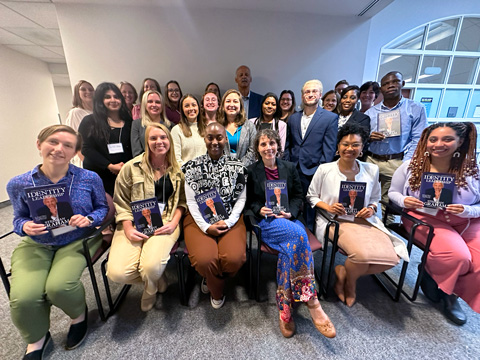by Chris Hilburn-Trenkle
The groundwork for the Golden Policy Fellows program began in October 2022. Less than a year later, the first cohort for the grant was officially announced in September.
The Golden Policy Fellows grant, made possible by a $3 million donation from an anonymous donor, seeks to support future social workers with the tools to implement change for both direct practice care (micro) and community, management, and policy practice (macro) in the current social work system for child and family welfare, not only through hands-on assistance but by enacting and influencing policy at the legislative level and transforming social work at the community level.
Twenty-five students in the School of Social Work MSW program who are set to graduate in 2025 were selected in the first of two cohorts, with a plan to bring in 25 more students over the course of the five-year grant. Each student has the potential to receive $30,000 in stipends over a three-year period. The first installment is given in the generalist year, the second supports students in their specialization year with a practicum placement that focuses on children, adolescents and families. The third installment is a $10,000 investment post-graduation for fellows who have secured employment in an underserved area of the state and will be providing services in support of children, youth and families. Fellows must make a two-year commitment to receive the career development stipend.
In addition to working in practicums that deal with child well-being, including mental health services and education, students will receive supplemental workshops and courses that focus on leadership skills for social workers, business skills, and legislative advocacy to help them in paving the way to make advancements through political policy and with the help of the business community.
 Stedman Graham, a New York Times best-selling author who received his bachelor’s degree in social work from Hardin-Simmons University and worked in the juvenile justice system early in his career, presented his Identity Leadership workshop to the fellows on Saturday, Sept. 23, which gave the graduate students an opportunity to hear from someone with a background in both social work and entrepreneurship.
Stedman Graham, a New York Times best-selling author who received his bachelor’s degree in social work from Hardin-Simmons University and worked in the juvenile justice system early in his career, presented his Identity Leadership workshop to the fellows on Saturday, Sept. 23, which gave the graduate students an opportunity to hear from someone with a background in both social work and entrepreneurship.
“Our philosophy of identity leadership is based on ‘You can’t lead anybody else until you first lead yourself,’” Graham said. “As far as I’m concerned everything is self-development and self-empowerment. I teach people how to self-empower, how to organize themselves, (and) how to work on themselves. I teach them a process for self-love and creating a vision and a plan and goal-setting. Teaching them basically how to organize a life around themselves. That’s a pretty powerful program, especially today when this is the age of identity and self-identity and preparation and preparing yourself for the future.”
Heather Gray, a second-year student in the three-year Chapel Hill MSW program, began preparing for her future after the outbreak of the coronavirus pandemic. She knew she wanted to make a career change, but she thought that would involve becoming a nurse practitioner or physician’s assistant to work in a direct role with families. After speaking with professionals in the medical field, she realized her calling was in social work.
Gray wants to help middle school students as they experience changes that come in a formative stage of their life, and because of the Golden Policy grant she believes she will have a chance to make an even bigger impact in that space.
“I am really excited for training in combining the macro and business side of things, like how do we actually affect change at a higher level,” Gray said. “Today was a great example of how I show up in a space is the first step in how I affect that change and I just want to keep learning along that path.”
For Victor Ajayi, the fellowship program provides a huge lift in helping him pay for his tuition and setting him along a path to helping adolescents with behavioral health issues.
While serving in the National Youth Service Corps in Nigeria post-graduation, Ajayi saw how the coronavirus pandemic impacted people living in vulnerable conditions, and he wanted to make a difference.
Ajayi began searching for universities in the United States with top social work programs and landed on the University of North Carolina at Chapel Hill. He used almost all of his monthly stipend from his job in Nigeria to pay for his graduate school application, and when he received his acceptance letter, his dream became a reality.
Currently a first-year student in the full-time MSW program, Ajayi feels like this grant opens yet another door for him, one that will change his life and hopefully the lives of countless others.
“This fellowship has brought ease for me. It is a life-defining event which took place today,” Ajayi said. “It’s going to bring a huge change for me and add value for me, which will (be) reflect(ed) in how I’m going to live my life every day, and of course it will make me a better person … I never thought I could get a fellowship like this. It’s created room for continued learning and continuous reflection about where I’m coming from and how to change the narrative, not letting my background determine what I want to become.”

